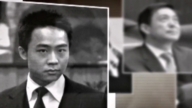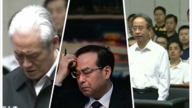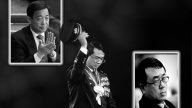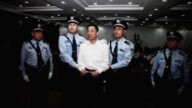【新唐人2013年07月13日讯】中共军队最近进行新一轮的将领调整。习近平十八大后成为军委主席,七大军区的高层调整至此才算完成。报导说,这次调整显示﹕40年代出生的共军将领退出了舞台,七名司令都是50后。那么,这次7大军区司令的调整,对习近平的枪杆子领导有什么作用﹖让我们来听听专家的分析。
中共军队近期进行新一轮的将领调整,成都与西藏军区更换司令员,其中成都军区副司令员李作成中将升任司令员﹔驻重庆的第13集团军军长许勇,成为西藏军区司令员,原西藏军区司令员杨金山 调任成都军区副司令员。
北京时政观察人士华颇﹕“习(近平)上任当然要对军队进行大换血,从军委到七大军区都要换上人,因为要打乱原有的军队人派关系,这样才有利于他更好的掌控军队,因为中国现在国内的矛盾加剧,再次发生六四那样事件的概率越来越大﹗所以习要变成一个强势领导人,必须要有枪杆子来撑腰﹗”
有分析认为,发生在1989年的六四事件,是因为当时的中共领导人邓小平,强势领导军队镇压才告结束。
华颇﹕“虽然说当初六四的时候,军队好些也是反对开枪镇压的,但是有邓小平的强势人物…现在如果再遇到那种情况,如果习要是没有邓那种权威,我看后果就不堪设想了。”
有人认为,从这次中共军队司令员的调度可以看出,现任中共领导人习近平提拔军队干部的标准,不特别顾虑派系,注重的是实战经验。
华颇﹕“首先李作成这个人是广州军区的,成都军区卷入薄王案,所以首先李作成从广州军区调来,来控制成都军区。再者,习近平这次重新启用他,当然他要对习近平感恩载德,要表示忠心。14集团军,就是不听话,是薄一波的老部队,那我就把13集团军的军长提拔起来。我想张海洋(原成都军区政委)那些亲信,肯定是不得势了。”
去年重庆王立军事件爆发后,中共前重庆市委书记薄熙来在中共两会一结束后,即刻被免去职务,而后,爆出前中央政法委书记周永康和薄熙来预谋对习近平发动兵变。
成都军区负责四川、贵州、云南、重庆防务,下辖13、14两个集团军。其中,驻守云南的14军,前身为薄熙来之父薄一波创建的山西新军。在王立军闯入美领馆事件之后一天,薄熙来高调访问14集团军。之前还有报导,重庆市长黄奇帆在薄熙来被拿下后,揭发出薄熙来不止一次对他谈过掌握军队的问题。他表示:“薄熙来声称,现在掌握在他手里的军队,至少有两个集团军。”
据大陆媒体报导,成都军区当时的几个高级将领与薄熙来关系密切,其中包括前成都军区政委张海阳。他们可能已涉入周、薄的政变计划中。
而这次中共七大军区高层调整后,据了解,七名司令都是50后,除了刚调任的成都军区李作成,和西藏军区的许勇之外,还包括﹕广州军区司令员徐粉林、济南军区赵宗岐、沈阳军区王教成、北京军区张仕波、兰州军区刘粤军、和南京军区的蔡英挺。
华颇﹕“中共历代领导人,都对军队进行一种封闭式的管理、洗脑式的教育,强调党对军队的绝对领导,但是社会上的这些思潮、多元化的思想,对军队的冲击到什么时候﹖什么程度﹖都是个未知数﹗就像当初苏联等中欧诸国那些政权的倒台,都是军队在关键时刻的倒戈﹗”
习近平除了更换司令员之外,还对多个省军区将领进行更换,如﹕新疆生产建设兵团军事部部长高龙福,调任陕西省军区司令员﹔南京军区副参谋长何卫东,调任江苏省军区司令员﹔福建省军区参谋长熊安东,升任江西省军区司令员。
采访/易如 编辑/周平 后制/李勇
Xi Jinping Reshuffles Officers in the Seven Major Military Regions
Recently, China has implemented a new round of
adjustment of People’s Liberation Army (PLA) generals.
After the Chinese Communist Party’s (CCP) 18th congress,
new leader Xi Jinping became the head of the military.
The seven major military regions have since
completed its appointment of high-level generals.
Sources say that commanders born after 1940
were all replaced during the re-shuffling.
The seven new commanders were born after 1950.
How does Xi Jinping benefit by making this move?
Let take a look.
This move included swapping commanders
between Chengdu and Tibet military regions.
Li Zuocheng, deputy commander of the Chengdu
military region, was promoted.
Meanwhile, Xu Yong, commander of the PLA 13th Army,
took over the Tibetan military region.
Yang Jinshan, former commander of the Tibet
military region, became Chengdu deputy commander.
Hua Po, Beijing current affairs observer: “Xi Jinping
certainly needs to reshuffle military personnel.
The Central Military Commission made changes
to the seven military regions.
The purpose is to disperse the army factional relationships,
because this way Xi can control his army well.
Because China’s domestic disputes have worsened, incidents
like Tiananmen Sq. Protest on June 4, 1989 can take place.
Thus, Xi needs to become a strong leader,
and needs military’s support.”
Analysts believe that military, lead by former Chairman Deng
Xiaoping, brutally suppressed the “June 4” protest in 1989.
Hua Po: “Although at the beginning, the military was against
the idea of shooting protesters, Deng Xiaoping tightly controlled the army.
If similar things happen again, but Xi isn’t as strong as Deng,
it will be a disaster.”
Some said that the military personnel re-adjustment shows
Xi Jinping’s principle of promoting military officers.
Xi wasn’t worried about which factions they belong to,
but was focused on their practical fighting abilities.
Hua Po: “Li Zuocheng was
in the Guangzhou military region.
As the Guangzhou military got involved
in the Bo Xilai and Wang Lijun cases,
Li was transferred from Guangzhou to Chengdu first,
preparing to take over Chengdu.
In addition, Xi Jinping promoted Li Zuocheng this time,
Li will certainly show his appreciation and loyalty.
The 14th Army isn’t as loyal to Xi as it was to Bo Yibo,
father of Bo Xilai.
Thus Xi focused on the 13th Army,
and promoted their commander.
I think former PLA secretary in the Chengdu military region,
Zhang Haiyang, and his allies, have lost their favor.”
Since the Wang Lijun incident in Chengdu last year, Bo Xilai
was immediate removed after the CCP’s two annual meetings.
And then, news broke out that Zhou Yongkang and Bo Xilai
had conspired to overthrow Xi Jinping.
Chengdu military region is responsible for the defense
of Sichuan, Guizhou, Yunnan and Chongqing.
The 13th and 14th Army are under the control
of Chengdu military region.
The 14th Army stationed in Yunnan Province, formerly known
as Shanxi New Army, was established by Bo Xilai’s father.
A day after Wang Lijun fled to the US Consulate in Chengdu,
Bo made a high-profile visit to the 14th Army.
Sources said that after Bo Xilai was sacked,
Chongqing major Huang Qifan exposed the fact that
Bo has told him several times that he had the control
of the army in his hands.
Huang said, “Bo claimed that he controlled at least
two armies.”
Media in Mainland China reported that at that time,
Chengdu military’s senior officers had close ties with Bo,
including Zhang Haiyang, the former PLA secretary
in Chengdu.
They likely were involved in Zhou Yongkang
and Bo Xilai’s coupe plan.
Sources said that seven of the PLA military regions’
new commanders are all born after 1950.
Aside from Li Zuocheng and Xu Yong,
this also includes Guangzhou military chief Xu Fenlin,
Jinan commander Zhao Zongqi, Shenyang commander
Wang Jiaocheng, Beijing commander Zhang Shibo,
Lanzhou commander Liu Yuejun
and Nanjing commander Cai Yingting.
Hua Po: “The CCP successive leaders conducted
a closed management and brain-washed the army.
They stressed the Party’s absolute power over the army.
However, it is still unclear how much of the public’s free
thoughts can influence soldiers, military officers and the army.
It could be like the collapsed regimes in Eastern Europe
and Russia –in the end, the military changed its stance and went against the regimes.”
Xi Jinping has not only appointed new commanders,
but has also replaced several military regions’ officers.
For example, Gao Longfu, director of Xinjiang Production
and Construction Army, was appointed Sha’anxi military commander.
He Weidong, Nanjing military deputy chief of staff
was transferred to be Jiangsu military commander.
Xiong Andong, Fujian military chief of staff
was promoted to be Jiangxi military commander.




























